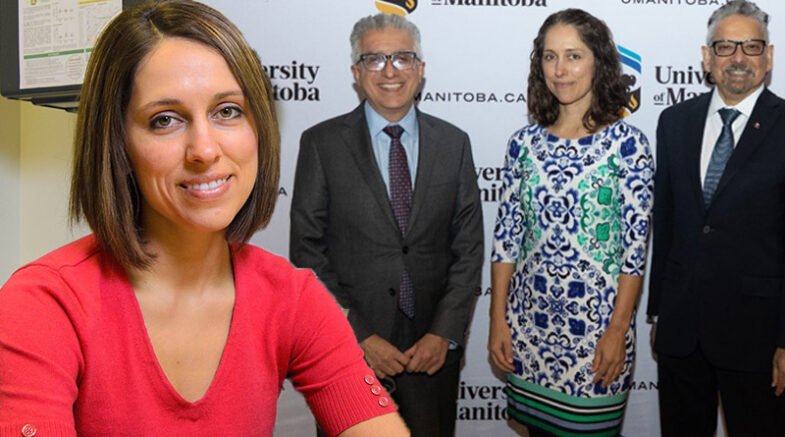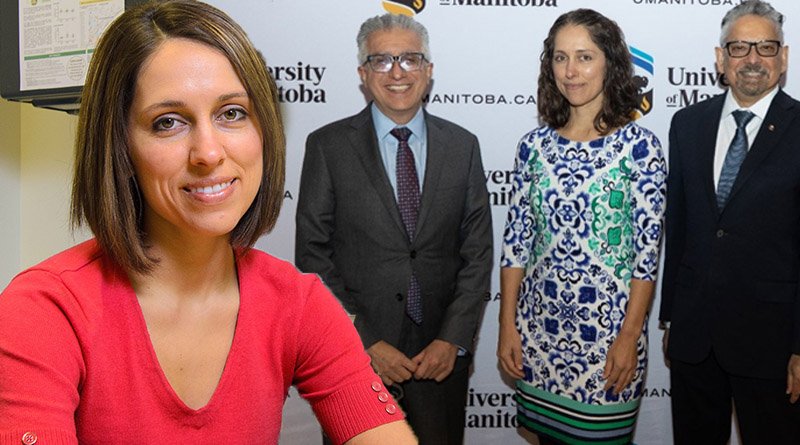The trustees of the E.W.R. Steacie Memorial Fund, a private organisation devoted to advancing science and engineering in Canada, present the Steacie Prize.

One of Canada’s most coveted prizes for researchers under the age of 40, the Steacie Prize is awarded to Dr. Meghan Azad of the paediatrics and child health department at the Max Rady College of Medicine in 2022.
The trustees of the E.W.R. Steacie Memorial Fund, a private organisation devoted to advancing science and engineering in Canada, present the Steacie Prize. Each year, the prize is given to a young scientist or engineer who has made a significant contribution to Canadian research.
Azad is the university’s third Steacie Prize winner and the first since 1971, which was 52 years ago. Since the award’s establishment in 1964, she is the first woman from UM to receive it.
Meghan Azad said, “I am honoured to receive this award and emphasise the importance of research about early nutrition and the developmental causes of health and disease. Even though these awards are given to a single person, I think a team science approach was involved in their creation. I appreciate all of the coworkers, mentors, and students who have helped our research, and I am grateful for the opportunity to work with them.”
Azad is a pioneering figure in the field of the developmental origins of health and disease, which focuses on the long-term effects of early experiences. She is doing groundbreaking research into how breastfeeding and breast milk affect children’s later health and susceptibility to disease.
Her pioneering research is still shedding light on how breast milk affects an infant’s microbiome, with the aim of preventing chronic illness and fostering healthy growth in infancy.
Azad holds a Tier 2 Canada Research Chair in the Developmental Origins of Chronic Disease and works as a research scientist at the Children’s Hospital Research Institute of Manitoba.
Her ground-breaking research has received national and international funding from the Bill & Melinda Gates Foundation, the Canada Foundation for Innovation, and the Canadian Institutes of Health Research. In the 144 peer-reviewed articles she has published, she has been cited more than 11,000 times.
Numerous awards have already been given in recognition of Azad’s work. Azad won the Joe Doupe Young Investigator Award from the Canadian Society for Clinical Investigation, the Ken Hughes Young Investigator Award in Medical Research, and the Outstanding Mid-Career Investigator Award from the International Milk Genomics Consortium in 2020.
Additionally, she has been listed as one of Canada’s Top 100 Most Powerful Women (2020) and Top 40 Under 40 (2020).
On March 28, coworkers from all over the university came together to recognise her achievement at a ceremony where Dr. Digvir Jayas, a member of the Steacie Prize selection panel, gave out awards.
Dr. Mario Pinto, UM Vice-President, said, “This Steacie Prize is an important recognition of Dr. Azad’s achievements and her world-leading research in the developmental origins of health and disease and a testament to the extraordinary research talent here at UM (Research and International).”
“We are incredibly grateful that she has made the University of Manitoba her home, and we are excited about the chance to jointly celebrate her amazing accomplishments.”
Her work is a wonderful illustration of discovery research, knowledge mobilisation, and knowledge translation for societal and economic impact that will be felt for many generations to come, both domestically and abroad.
In order to promote healthy growth and prevent chronic disease during crucial early development stages, Azad was founded. She and Dr. Nathan Nickel founded the Manitoba Interdisciplinary Lactation Centre (MILC) to accomplish this. The MILC is the world’s first facility devoted to interdisciplinary research on breastfeeding and breast milk.
Azad created the International Milk Composition Consortium by expanding MILC’s scope internationally and building on its success (IMiC). Four research teams working on projects related to maternal nutrition and infant growth are brought together by IMiC in Tanzania, Pakistan, Burkina Faso, and Canada.
Meghan Azad said, “I’m motivated by the thrill of conducting cutting-edge research and the desire to translate discoveries to have a significant impact on child and maternal health globally. ”
“It’s encouraging to see breastfeeding and breast milk research and advocacy being acknowledged as a significant field on a national level. Numerous coworkers, students, and research participants are involved in this work. I appreciate them all and am eager to work with them on the upcoming projects.”
The International Perinatal Outcomes in the Pandemic (iPOP) Study, led by Azad and collaborators, was recently established to investigate the effects of pandemic lockdowns on preterm birth rates.
More than 100 researchers from 42 different countries contributed to iPOP, and the results were just published in Nature Human Behaviour. She also serves as the deputy director of the CHILD Cohort Study, which follows 10,000 participants across about 3,500 households to find out how early experiences affect lifelong health.
Natalie Rodriguez and she are co-directors of the multidisciplinary THRiVE Discovery Lab. Azad participates in the joint US/Canada Human Milk Composition Initiative in addition to her numerous ongoing research projects. She co-developed the Trainee Expansion Program, a global exchange initiative for research trainees, while serving on the Executive Council of the International Society for Research in Human Milk and Lactation, where she is also a member.
